- Home
- Juliet Marillier
Den of Wolves Page 29
Den of Wolves Read online
Page 29
I could think of nothing to say.
‘I’m entirely serious,’ Gormán said. ‘If you value Grim’s safety, if you value your own, stop meddling now.’
30
~Cara~
She hadn’t intended to go back to the library. A whole morning spent poring over those manuscripts was more than enough. But she’d left her warm shawl there and it was getting cold outside. There might be rain. As she walked toward the library Cara thought of the trees sucking up moisture, breathing the damp air, stretching and easing themselves in the slow way they had. It would be interesting to be a tree. A long, gradual sort of life, with many visitors. A tree could observe the passing of time in a way no man or woman ever could. A tree could see generations of birds and squirrels and humankind be born and live and die, it could see wars fought, it could see flood and fire and disease ravage the countryside. It could see saplings grow from its own seed, ready to take its place when it finally succumbed to age and decay or the axe of the forester.
Oh, she missed Gormán! His wise words, his little jokes, his sideways smile, as if he and she shared secrets nobody else knew. It was so long since she’d seen him. That night didn’t count, the night he’d helped rescue her. By the time she’d started to get over her shock, she’d been all tucked up in bed with Aunt Della fussing over her. And the next morning, when she’d asked if she could say goodbye, Father had said no. Just like that. Which meant there was something really odd going on, not just what Father had said about the workers but something else.
Cara pushed open the library door. She took a step inside and stopped in her tracks. The three men who were standing by the table turned to stare at her. Three of those men, the Swan Island warriors.
‘Oh,’ she whispered, backing away. ‘Sorry.’
‘Wait,’ said a male voice behind her.
Cara froze.
‘You were going in, weren’t you?’ It was the young one, Cúan. He stepped around her and motioned forward. ‘We’d like a word, anyway.’
A birch in a spring storm must feel like this, Cara thought. Trembling all through. As if the wind might topple her. But a birch has roots in the ground, strong roots. They held her steady. She walked forward. If she tried hard enough, maybe she could make her voice work.
‘Sit down,’ said one of the others, the man who looked like a hawk. ‘My name is Ségán.’
‘Art,’ said a broad-shouldered, dark-bearded man.
‘I’m Caolchú.’ This one looked friendly enough, with an amiable face and a shock of wheaten-fair hair. A warrior, though; his muscles were like knotted ropes.
‘And you know my name,’ Cúan said. ‘No need to be alarmed.’
‘I just . . .’ Her voice was a timid mouse’s, a secret vole’s, a spider’s, a wren’s. She cleared her throat. ‘I just wanted my shawl.’ What were they doing here?
‘Please,’ said Ségán. ‘Be seated. We have a few questions for you.’
‘I can’t . . . I have to . . .’ She moved forward anyway and sat on the bench he was indicating. Seated, it might be easier to hide the shivering. Be like Blackthorn, she told herself. Be brave. Be strong.
Ségán sat down opposite her. ‘You’ve been spending your mornings here with Mistress Blackthorn, is that right?’
That one was easy. A nod was enough.
‘Doing what, exactly?’
Cara could hear Mistress Blackthorn answering, None of your business! But the words wouldn’t come out at all. Not those words. Not any words, now. The walls felt very close suddenly. She could hear the beating of her own heart. She shook her head.
‘Tell us, Cara.’ The man called Art was standing behind Ségán with his brawny arms folded. Caolchú was turning the pages of a book, not looking at her. If that was supposed to reassure her, it wasn’t working. Cúan was over by the door now. On guard? Against what?
What is this, an inquisition? Blackthorn would say. Or, Since when did fighting men have an interest in scholarship? Or, I refuse to say a word without witnesses present. Cara opened her mouth. Tried to speak.
‘This might be more successful if you let Cara write her answers down for us,’ Cúan suggested.
Ségán frowned. ‘Fetch some materials, Caolchú.’
Cara breathed. This would be over soon, whatever it was. Quill, ink pot and scrap of parchment were duly set in front of her.
‘Is she unable to talk?’ Ségán was looking at Cúan. Asking the question over her head, as if she were not there. Or as if she were a half-wit.
‘She can talk. But not always easily.’
‘This will be slow. Never mind, I’ll keep the questions simple.’
Wonderful. He did think she was a half-wit. Maybe she could scribble all over the page, or make a drawing of a tree. Or a row of little men with patterns on their faces.
‘Write down what work you’ve been doing in the library, all these mornings.’
Reading books of old tales, she wrote. Then drew a tiny book, open. That made her feel calmer. No need to tell him any more than exactly what he asked for.
‘Has Mistress Blackthorn been doing the same work?’
She helps me sometimes. She drew Mistress Blackthorn, chin in hand, frowning over a great tome. Looked up to see Art, Caolchú and Cúan watching with grins on their faces. Ségán looked as grim and intent as before.
‘Has Mistress Blackthorn spoken to you about the past, before she came to Winterfalls?’
Cara realised she had stopped shivering; the drawing had helped. You couldn’t do a good drawing with shaky hands. ‘No,’ she said.
‘She speaks,’ said Ségán, his eyes fixed on her face. ‘Are you quite sure about that, Cara?’
Yes, she wrote.
‘This belongs to Mistress Blackthorn, doesn’t it?’ He nodded to one of the others, who came forward and put a little book down on the table. Cara felt her heart lurch. Mistress Blackthorn’s notebook. Her wise woman book. Her secret book. How had these men come by it? Why hadn’t Blackthorn taken it with her?
Yes, she wrote. She wished she was brave enough to write, and it’s private.
Ségán opened the notebook. A marker had been placed between the pages, quite far through. Cara spotted a drawing, some kind of plant, and on the opposite page the wise woman’s script, smaller than usual as if to fit as much there as she could. He held it open before her. ‘Is this her writing?’
Cara pushed it away. A wise woman’s book is secret, she wrote.
Ségán passed the notebook back to the other man. ‘I only need to be sure this is Mistress Blackthorn’s own account,’ he said. ‘Does she write in this book while the two of you are in the library?’
Cara didn’t like his searching eyes. That look was like the one Father used when he was disappointed in her. When she had failed to be the perfect daughter he expected her to be. She didn’t like his tone of voice. What business was it of his what Mistress Blackthorn was writing or where? ‘That’s her personal notebook.’ Being angry seemed to help the words come out. ‘Where she writes down useful things about her work. Remedies, drawings of herbs, potions. She doesn’t do that here. But sometimes she writes . . . notes.’ Cara would have had to be blind not to notice those loose pages filled with small neat writing. She would have had to be stupid not to see how Blackthorn hid them somewhere different every night. But unlike these bullies, she knew when something was none of her business.
‘Notes. Where?’
‘Just on . . . pages. Parchment.’
‘And where are those pages now, Cara?’
Nothing in the world could have persuaded her to tell him. Without a doubt, Mistress Blackthorn would expect her to keep it secret. But she couldn’t stop her eyes from going to the shelves, stacked full of books. It was only for a moment, but Ségán saw it.
‘Here in the library?’
‘I
don’t know where they are.’ Not quite a lie; they were here somewhere, but she didn’t know exactly where.
‘Mistress Blackthorn is your friend, isn’t she?’
Cara nodded.
‘Telling me anything you know about this will be in her best interests. We mean her no harm.’
‘She only went to Longwater. She’ll be back before supper time. Why don’t you ask her yourself?’ All those words, and with him staring at her. Blackthorn would be proud of her.
’You know where those notes are, don’t you? Show me.’
‘I . . . I . . .’ Curse it! No, she wrote. The pen wanted to write, Stop it! You’re scaring me! but she made it draw a little picture of an owl instead, and beside it, May I go now please?
‘Just one more –’ Ségán began.
The door flew open and with a shrill barking the white terrier, Bramble, came hurtling in, closely followed by a furious Mhairi. ‘What is this?’ Flidais’s maidservant demanded. ‘Four of you questioning one young girl, and all behind closed doors with not another woman in sight! What would Lady Flidais think? You should be ashamed of yourselves! Come, Cara. Whatever this was, it’s finished. Bramble, stop that noise!’
31
~Bardán~
Night. Dark night. The moon hiding away. Scared to show her face. What might she see? Murderers and thieves, beatings and killings and blood, so much blood . . . Dáire, her sweet face peaceful, sleeping her last long sleep. Sleeping in a sea of blood, the sheet dyed violent red. He had thought he might die of grief. Would have made an end of himself. But there had been Brígh. Tiny, struggling, crying those wrenching sobs. Bloody herself, until he cleaned her and swaddled her and carried her down to Longwater, looking for help. They came up and helped him bury Dáire. They would have taken Brígh from him. Said he was out of his mind with sorrow, which he was, then. Said he couldn’t cope on his own, told him the babe was too small for goat’s milk, told him she’d have a better home with them, told him all sorts of things. It’s coming back now, in the dark, while not far off Grim stands on his hands and hauls himself up on ropes and does what he does to hold off his own demons.
They were right about one thing. He couldn’t be father and mother to Brígh and earn a living as well. But he wouldn’t give his child to Dáire’s kinsfolk. Once they had her they’d make her theirs forever. They would not let Bardán be her father. They’d never approved of Dáire marrying a man like him. If he let them take his child, if he let them raise her, Brígh would be lost to him forever.
So he had reasoned, not that there’d been much reason about that brutal time, when Dáire’s burial rite had turned into a screaming argument and he’d been accused of all manner of crimes, lies every one of them. Brígh had screamed, too, in someone else’s arms, and he’d wrenched his daughter away and hurt her doing it, making her cry as if mortally wounded. He had ordered them all away. Then he’d put his child on his back, and taken his tools, and walked to Wolf Glen. Thrown himself on Master Tóla’s mercy, offering work in return for a place to stay and someone to look after his child. Shown Tóla what he could do, his skills, his special touches with wood. And Tóla had hired him to build the heartwood house.
They got a woman in to feed Brígh. He remembers that. No need for goat’s milk. He worked long days. Not that he didn’t want to do a good job. He was grateful. Brígh was safe, warm, secure. And not being turned against him. How could he not be glad of that? But he was sad to see his baby only for a little each day, in the evenings, when often as not she was already tucked up in her cradle fast asleep. He’d sit by her awhile, singing the song his mother had sung to him long ago. Feather bright and feather fine, none shall harm this child of mine. But they did. Someone did. Someone took her out into the forest and left her there, and she died. Not him. He wouldn’t have done that. He couldn’t have done it. Not to Brígh. Not to his precious baby girl. It was someone else, some evil-doer, the fey perhaps. But the fey wouldn’t have left her in the oak roots. They would have taken her for their own. Instead of taking him, they would have taken his daughter. The fey were like a hungry fire. They were like the drowning sea. You could feed them and feed them, but they were never satisfied.
‘You awake, brother?’ Grim has stopped doing his exercises; the voice in the darkness comes from his pallet.
‘Awake. Thinking. Remembering. Might be truth. Might only be hopes and wishes.’
‘Got a question for you.’
‘Mm?’
‘You know that rhyme you sing sometimes, the one about the birds? Feather bright and feather fine, that one?’
In the night, without seeing, without speaking, they’ve been thinking of the same thing. ‘My mother would sing it,’ he says. ‘When I was dropping off to sleep. To keep me safe.’ That feeling, that warm, good feeling – how precious it had been. He had sworn to love Brígh the way he had been loved. He had promised her, had promised Dáire with tears choking his voice, that he would protect her. ‘I used to sing it to my baby. Only I must have done it wrong. Because she wasn’t safe, she was hurt, she was killed.’ Sobs well up. He puts his fists against his mouth to hold them in.
‘Sorry, brother.’ Here’s Grim, moving over to sit beside him, putting an arm around his shoulders. And here’s Ripple, creeping in on the other side to lay her head in his lap. ‘Didn’t mean to upset you. Only, I was wondering if you could sing it to me again, the whole thing through. Or tell me the words.’
‘Why?’
‘You know my friend. Blackthorn. You saw her today. She loves old rhymes and songs and stories. I told her about your song, your lullaby. She said she’d like to hear it.’
‘Breaking the rules again. The master’s rules.’
‘Blackthorn and me don’t worry much about other folk’s rules.’
Can he bear to sing the song? He thinks of Brígh in his arms, the slight soft weight of her, the wispy nut-brown hair, the shadowed lids closed over her lovely eyes. The tiny fingers curled around one of his. The creamy skin, the perfect small ears. His daughter. His only treasure. He wonders if the Red Giant might have kept his baby son if he’d had the right lullaby. He wonders, for a moment, if singing the song now might bring Brígh back. ‘Starling, woodcock, owl on wing,’ he whispers. ‘Nightjar, chiffchaff, bunting sing, goldcrest, warbler, thrush and jay, redpoll, siskin darting by . . .’ He goes through the whole song. Then Grim asks him to say it again. Up above, the owl hoots, maybe joining in, maybe talking to another owl out in the wood somewhere.
‘Your mother like birds, did she?’ Grim asks.
Bardán’s stroking Ripple. Her ears are soft. Her head’s heavy on his knees, as if she’s gone to sleep. ‘How did you know that?’ he asks.
‘Just wondered. With the rhyme and all.’
‘Birds would follow her around. She’d sit out in the sun with her embroidery and they’d perch close, all kinds together. She put them in her pictures.’
Grim goes quiet. He goes quiet for a long time. Bardán sits quiet too, thinking of his mother. Wishing her embroideries still hung bright and perfect on the walls of that little house. One of them was all birds. Every bird from the song: starling, woodcock, owl and the rest. And some that were not in the song. Every birdling in the wood, she had told him when he asked. You can’t afford to forget even the smallest of wrens. He hadn’t known it at the time, but she’d been talking about the heartwood house.
‘Bardán?’
‘Mm?’
‘How well did you know his wife? Tóla’s wife? Suanach, was that her name?’
‘Hardly saw her. I was working. She didn’t come out much.’
‘What was she like?’
He tries to remember. A little, wispy woman who hardly ever smiled. When she had come out of the house, Tóla had shepherded her around. Watched every step as though she might break if he took his eyes away. Bardán gets a sudden picture of her holdi
ng a child, with a shaft of sunlight coming through a window and lighting up both their faces. ‘She was fond of Brígh,’ he says. ‘Used to call her love, sweetheart, precious. She was fussy. Never satisfied, that’s what the nursemaid used to say. Mistress would undo the swaddling and wrap the baby up all over again. Thought she was the only one who could do it just right.’ It’s coming back, more of the past, more of that time. ‘She didn’t like me coming into the house to say good night. Said it disturbed Brígh. That made me angry. Only I couldn’t be angry. Had to swallow it down. I had nowhere else to go.’
‘Holy Mother of God,’ murmurs Grim. There’s another silence, then he says, ‘Suanach’s own daughter must have been born around the same time as your Brígh, though.’
What is he talking about? What daughter? ‘There was a boy. The nursemaid’s child. And Brígh. Enough milk for two.’
‘But the master’s daughter, Cara – she’s fifteen now, nearly sixteen. She’d have been here. Or expected.’
‘Why are you asking this?’
‘Just tell me, Bardán. If you can.’
‘They had no children. Don’t think she was expecting one. Little tiny woman – it would have showed. And nobody spoke of it. Must have been born later. Long after. After I . . . after that night, when I ran and fell and lost myself.’
‘Must have been,’ says Grim. ‘Come to think of it, someone did say the master’s wife went away to give birth. Went to her kinsfolk.’
‘I didn’t kill my baby,’ Bardán says. He’s sure of it now. ‘I didn’t do it, Grim. She was safe in the house that night. Tucked up in bed. Mistress wouldn’t let me in to see her. Not the first time she’d done that. Said Brígh was fast asleep and wouldn’t know if I was there or not, so it didn’t matter. I said I’d know, and she got angry, and then the master came and sent me back to my quarters. Gormán made supper. Some sort of stew, full of spices. And then . . . later . . .’ Something bad. Something dark and terrible. A pain so crippling he thought his head would split apart, and his bowels turning to water, and things pursuing him, monsters and demons and creatures all spiky teeth and rending claws and screaming voices that made his whole body shudder. Running from them, running through the forest. Rough hands grabbing him, dragging him, pulling him down. Falling, falling . . .

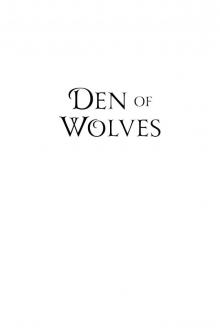 Den of Wolves
Den of Wolves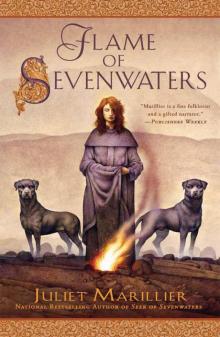 Flame of Sevenwaters
Flame of Sevenwaters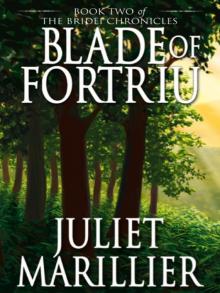 Blade of Fortriu
Blade of Fortriu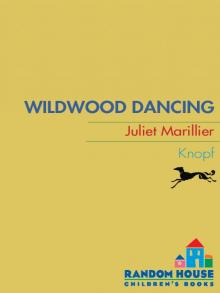 Wildwood Dancing
Wildwood Dancing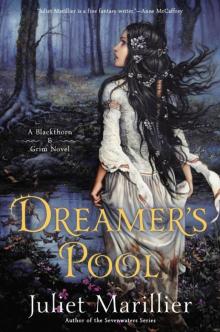 Dreamer's Pool
Dreamer's Pool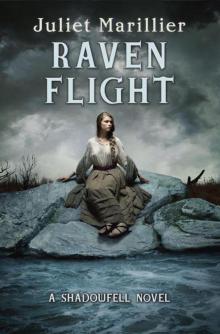 Raven Flight
Raven Flight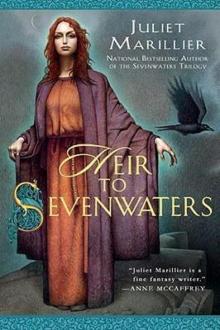 Heir to Sevenwaters
Heir to Sevenwaters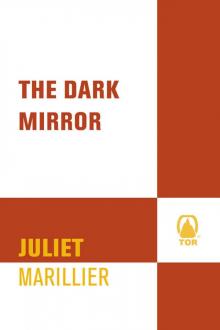 The Dark Mirror
The Dark Mirror Daughter of the Forest
Daughter of the Forest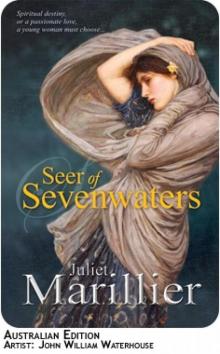 Seer of Sevenwaters
Seer of Sevenwaters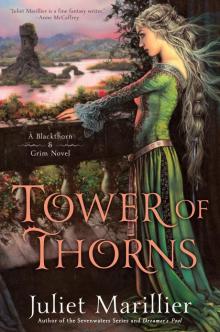 Tower of Thorns
Tower of Thorns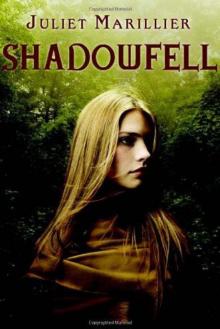 Shadowfell
Shadowfell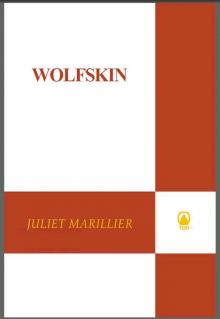 Wolfskin
Wolfskin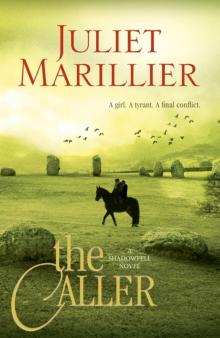 The Caller
The Caller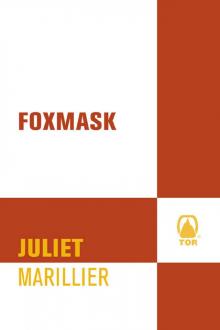 Foxmask
Foxmask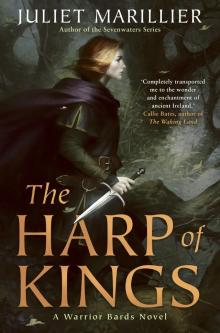 Harp of Kings
Harp of Kings The Well of Shades
The Well of Shades Heart's Blood
Heart's Blood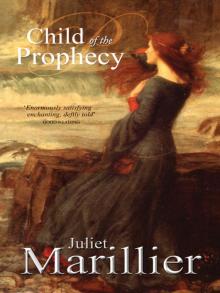 Child of the Prophecy
Child of the Prophecy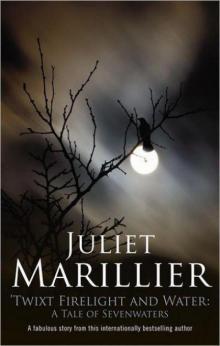 Twixt Firelight and Water
Twixt Firelight and Water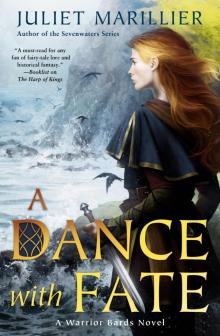 A Dance with Fate
A Dance with Fate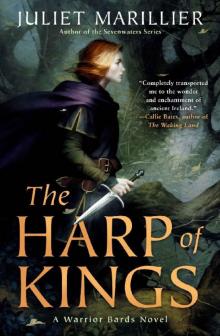 The Harp of Kings (Warrior Bards)
The Harp of Kings (Warrior Bards)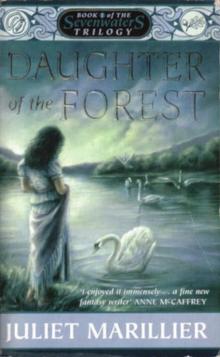 Daughter of the Forest (The Sevenwaters Trilogy)
Daughter of the Forest (The Sevenwaters Trilogy)![Sevenwaters [06] Flame of Sevenwaters Read online](http://i1.bookreadfree.com/i2/04/08/sevenwaters_06_flame_of_sevenwaters_preview.jpg) Sevenwaters [06] Flame of Sevenwaters
Sevenwaters [06] Flame of Sevenwaters![[Sevenwaters 04] Heir to Sevenwaters Read online](http://i1.bookreadfree.com/i2/04/12/sevenwaters_04_heir_to_sevenwaters_preview.jpg) [Sevenwaters 04] Heir to Sevenwaters
[Sevenwaters 04] Heir to Sevenwaters